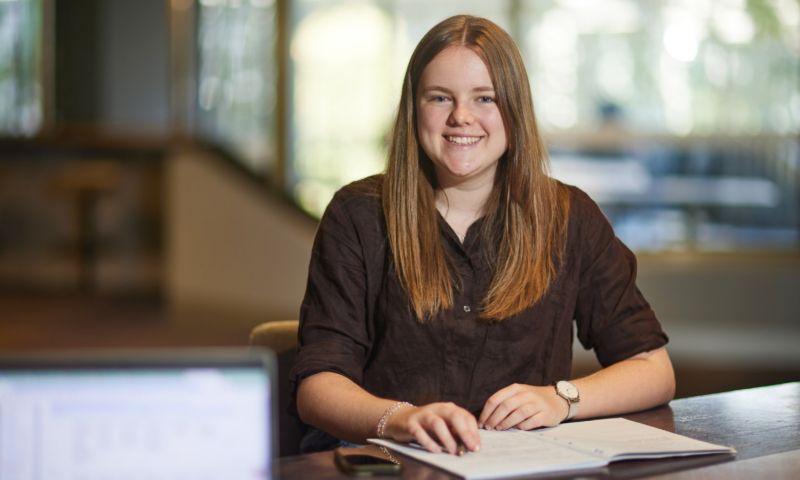Conflict in Iraq almost shattered Noor Abba’s dreams of becoming an architect. Now she’s back on course, supported by the Northcote Trust Scholarship.
Noor Abba doesn’t want to waste a minute.
She’s a hard-working student with a busy part-time job, an enthusiastic volunteer and a fervent networker, keen to connect with other women in industry.
She’s eagerly looking to gain work experience in architecture, even though she has several years of study still ahead. And when she talks about what she’s learning at uni, her face lights up.
This impatience isn’t surprising when you consider her learning – and life – was put on hold for years as she and her family found themselves in limbo after fleeing their home in Iraq.
Born days after the US invasion of Iraq in 2003, Noor grew up in Qaraqosh (also known as al-Hamdaniya and Bakhdida), a Christian community in the northwest of the country. The threat to Christians was ever-present.
 Noor Abba
Noor Abba
“It was really hard to live there,” she says.
By 2014, the rise of ISIS meant the family were at greater risk than ever.
Noor recalls being on the roof of her house and watching bombs fall a few kilometres away. She was just 11.
“In the morning, we decided there’s no way we are staying here. We need to leave as soon as possible,” she says. “We left everything.”
The family – including her heavily pregnant mother – fled to Erbil, another state in Iraq that was safer. The journey should have taken just two hours, but they spent more than 14 hours on the road because so many Christians were headed the same way.
“It was traumatic,” she says. “I was in the car sitting there silent and feeling small and shrunk. And I'm thinking, am I going to stay alive? Are we going all to die in here? We were freaking out to the point that no one was even speaking. It was silent tension.”
What Noor, now 21, witnessed has stayed with her ever since. “There were kids suffering. There was no food. People were sleeping on the street. You had a home, a car, a job, everything, and then within 24 hours you were sleeping on the street like you were homeless.”
The family took refuge in the new location, and it was four years before they returned to their hometown. What they found there was devastating.
“Our house was burned to nothing. I have nothing from my childhood – not one picture, nothing. All the documents were burned, everything was burned to ashes,” says Noor.
Although ISIS had gone, it had left its mark. Noor remembers everyone feeling tense, appearing normal on the surface but with deep emotional scars from the trauma they had experienced.
In 2018, the family made the decision to move again, this time to Jordan. There, they hoped they could access the medical care Noor’s young brother – who had been born just after they fled their hometown – desperately needed.
In Jordan, Noor’s parents heard they might be able to get humanitarian visas for Australia. Determined to prioritise their children’s safety and education, they applied and were successful. Flights were booked for the last week of April 2020.
“We were really excited,” says Noor. “We were packing up and had sold items from the house.”
Then three days before their flight was due to leave, they received a call. The COVID pandemic meant all Australian airports had been closed. Their flights were cancelled.
With no sign of the borders opening again, Noor put her life and dreams on pause.
In preparation for the move, she had given up her place at high school, and she couldn’t get back in. She couldn’t work because as a refugee from Iraq she didn’t have the correct paperwork.
When the pandemic subsided, she started to take some courses, and learned English. But she admits she had lost all hope of ever making it to Australia and leading a normal life.
So she could hardly believe it when, in March 2022, her mum told her their flights had been rebooked. They were going to Australia after all.
“I was like, there is no way things will be going right for once!”
The family landed in Australia two months later. Noor’s English studies had prepared her well for the move. As the eldest of four siblings, and the most proficient in English, she sorted out the lease on their new home, and organised utilities.
The only thing she sought help with was her education.
The organisation assigned to help her family settle suggested she apply to RMIT, given its strong reputation in architecture and design.
She secured a place on the Certificate IV in Tertiary Preparation (Engineering), then moved onto the Advanced Diploma of Building Design (Architectural). In the second semester of that course, she learned she’d been awarded the Northcote Trust Scholarship.
The scholarship provides up to $5,000 a year for students who have progressed or intend to progress from an RMIT diploma to an undergraduate degree in a similar field.
Noor, who hopes one day to become a registered residential architect, describes the scholarship as a safety net that has allowed her to finally pursue her dreams.
When you're a kid that comes from war and it was really hard to have the basic needs of food, water, somewhere to sleep, it's really, really, really important for me that someone is giving me this unconditional support, I really appreciate them seeing the potential in me.

Life-changing scholarships
Give to scholarships and help create life-changing opportunities for students facing barriers to education.